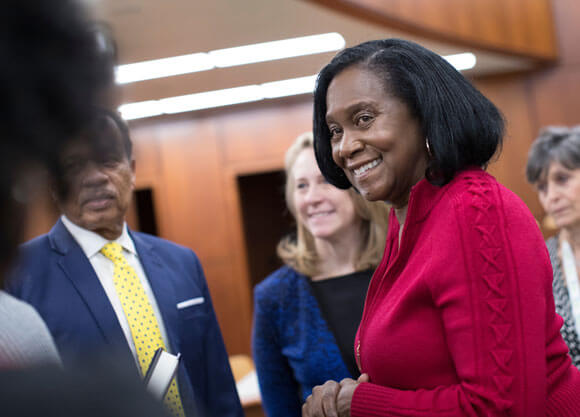
Founding Quinnipiac Law professor dedicates life to providing equal justice for all
February 01, 2022

February 01, 2022

Entering the second semester of her 44th year of teaching law, Ford was deeply impacted by the civil rights movement of the 1960s and has since dedicated her life to obtaining justice for those in need of representation.
Born in Arkansas to a young couple of sharecroppers on the same plantation that her great-great-grandfather worked on as a slave, her roots were deep in witnessing mistreatment and her determination to see change was fierce.
“I watched my people – Black people – be abused and be oppressed,” said Ford. “I knew there was a problem. I realized that you could change some minds, but you really need to change laws and then advocate not only to change the laws, but to actually to see those laws enforced.”
After attending all-Black elementary and high schools, Ford graduated from community college with a degree in economics before answering her true calling by attending the University of Iowa College of Law on a full scholarship.
After spending her first year of law school at the University of Iowa, Ford decided to move to New York City.
“I went to a major Wall Street law firm, but I still spent my weekends and my spare time volunteering in Harlem, doing the kind of work that I wanted to do — trying to help people improve their circumstances and making sure that they got the quality of justice they deserve,” Ford said.
Eventually, she was inspired by leaders, such as Ruth Bader Ginsburg, to transfer to Rutgers University and complete her J.D. Even after graduating from law school, her ambition continues.
As the last Quinnipiac School of Law founder still working at the university, Ford now teaches courses in Native American law, business formation and organization and civil rights.
Since teaching at Quinnipiac, Ford has represented a Ledyard-based Native American group in the Oneida Indian Land Claim case. According to Ford, it was the largest case of its kind in the country, as the group was fighting to get back land that she said was taken improperly in the 1700s.
Ford also represented rap artist Keith Murray, a case she would have passed on if it were not for the students who were working with her at the time.
“I'm sitting in my office with four or five students,” Ford said. “I got a call and the man on the phone said, ‘Is this Ms. Ford?’ I said ‘Yes.’ He said, ‘This is Redman and I’d like you to represent Keith Murray.’ I had no idea who he was. I listened to 70s music. The students heard me and right away, they said, ‘Professor he's a top recording rapper,’ but I took the case because I felt he had not been dealt with fairly.”
Outside of the lecture hall, Ford has worked side by side with students. Sometimes they worked into the early morning hours, researching and writing to prepare for cases.
At one point, Ford had more than 40 students working on a case. She keeps in touch with many of them. She tells those who are new to law school and the legal field to think broadly and always want to perform some service that helps others.
“That's one of the things that this profession is designed for,” Ford said. “I tell them they can be prosecutors, or they can be public defenders. Prosecutors have discretion and Black people and Black men, in particular, are disproportionately prosecuted and incarcerated, so there’s a need there.”
Ford’s main areas of focus are voting rights, education and economics.
“Protecting rights and making sure that the next generation is educated properly is how they will be prepared to become productive citizens,” Ford said. "Help people become entrepreneurs or help big businesses that are thriving. Cast the net as broadly as they want to cast it, but make sure that they're doing it in a way that they're trying to help.”
Get the latest news and events sent right to your email by subscribing to Quinnipiac Today.
Subscribe